Key figures in the black rights movement
Here are short profiles of some of the key players in the black civil rights struggle.
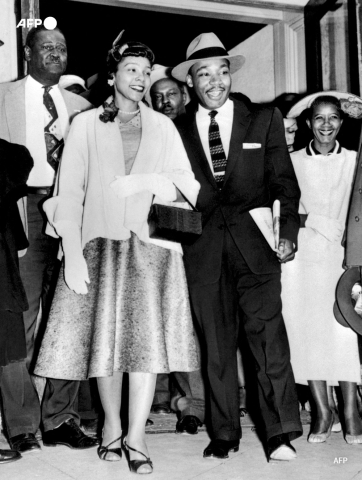
- Martin Luther King -
As perhaps the most revered figure of the movement, King's reputation lives on decades after his assassination in 1968.A charismatic hero in the fight for racial equality, his famous "I have a dream" speech in Washington in 1963 has marked generations since.
King was born in 1929 in Atlanta in the conservative south but left to continue his studies, eventually earning a doctorate in theology at Boston University.
A Baptist preacher and inspirational speaker, his first parish was in Alabama where -- influenced by India's pacifist activist Mahatma Gandhi -- he started his involvement in peaceful protests against segregation.
He rose to prominence as a leader of the ultimately successful year-long bus boycott by blacks in the state capital Montgomery that started in 1955.
Considered too militant by conservative blacks and too timid by more radical leaders like Malcolm X, King also had to fight the Federal Bureau of Investigation (FBI) for most of his adult life.
The FBI called him the "most dangerous Negro to the future in this nation" and was responsible for telephone taps, blackmail, threats -- right up to 1964 when he won the Nobel Peace Prize.
The civil rights movement that he led forced Congress to approve the Civil Rights Act that in 1964 outlawed discrimination and the Voting Rights Act one year later.
King was killed by a bullet to the head while standing on the balcony of his motel room in downtown Memphis, in the southern state of Tennessee, on April 4, 1968. He was just 39 years old.
Escaped convict James Earl Ray confessed to pulling the trigger but later recanted, leading to suspicions of a conspiracy or cover-up.
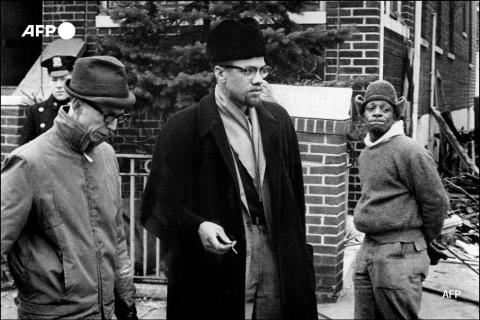
- Malcolm X -
Considered with King as one the most influential African Americans in history, Malcolm X was an outspoken Muslim advocate of the rights of blacks although critics said he preached racism and violence.
He became known as a minister and spokesman for the Nation of Islam, a radical black pride group that he joined in the 1950s and still exists today.
In this role he advocated black self-dependence and esteem but also did not shy away from the use of violence for self-protection.
His stance led to a dramatic spike in the group's membership. But, disillusioned, he broke away in 1964 and formed the short-lived Organization of Afro-American Unity (OAAU) to continue the promotion of black rights and also push cooperation among Africans.
Born Malcolm Little in 1925, he fell into petty crime as a young man and it was from jail that he became a devout follower of Islam.
On his release, he changed his surname to X as a symbol of the original name of his family lost under slavery.
Malcolm X was gunned down in Harlem in February 1965 by three men with links to the Nation of Islam who were later convicted. He was 39 years old.
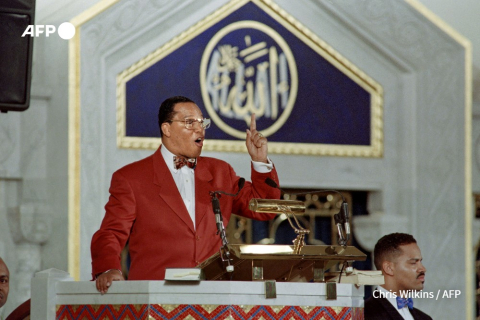
- Louis Farrakhan -
Farrakhan became one of the fieriest black voices in America's race debate but also drew scorn for remarks deemed racist, anti-Semitic, homophobic and sexist.
He was born in the New York's Bronx on May 11, 1933 and in his early 20s dedicated his life to the Nation of Islam, convinced by its messages of black empowerment preached by group leader Elijah Muhammad and spokesman Malcolm X.
After Muhammad died in 1975, Farrakhan broke with the late leader's son and reformed the movement, eventually taking back the name Nation of Islam.
Twenty years later he called the historic Million Man March that drew hundreds of thousands of black men, including future president Barack Obama, to Washington to hear calls for unity and an end to the ills plaguing the black community.
"Black man, you don't have to bash white people," he said in a two-hour speech on the doorsteps of the US Congress. "All we got to do is go back home and turn our communities into productive places."
In 2000 Farrakhan denied playing a role in Malcolm X's assassination after he had earlier told CBS television that he "may have been complicit in words that I spoke."
Ill-health forced him to step aside from the the Nation of Islam's day-to-day operations in 2006.
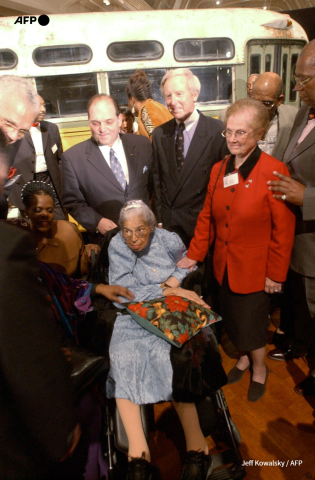
- Rosa Parks -
A petite black seamstress, Rosa Parks sparked the US civil rights movement in 1955 when she refused to give up her bus seat to a white man.
Then in her early 40s, she was fined $14 and arrested, an act that sparked the black bus boycott in Montgomery, the profoundly segregated capital of Alabama.
The boycott ran from December 5, 1955 to December 20, 1956, and was led by then-little-known King, propelling him into the limelight.
During the protest, black workers walked to their jobs or paid black-owned taxi drivers 10 cents -- the same amount as the bus fare -- to get to work.
It ended only after the US Supreme Court ruled that segregation on city buses was unconstitutional.
Parks lost her job as a result but she had changed the course of American history. She was awarded the nation's highest civilian honour, the Presidential Medal of Freedom, in 1996.
In an autobiography published in 1992, she explained that it was not fatigue from a day's work that had prompted her to stay seated in 1955. "The only tired I was, was tired of giving in," she said.
Parks died in 2005 at the age of 92. Before her funeral her body lay in state at the US Capitol, the first woman paid this tribute.
- Black Panther Party -
The Panthers were a nationalist self-defence group founded in 1966, influenced more by the confrontational attitude of Malcolm X than the passivism of King.
The socialist-inspired movement launched with a 10-point plan that started with "We want freedom" and followed with demands for jobs, decent housing, an end to police brutality against blacks and "education that teaches us our true history".
The quasi-paramilitary outfit, often photographed with weapons, were militant in style and in their practise of self-defence of minority communities against harassment from the police, who were mostly white at the time.
Its aggressive posture alarmed whites and soon after its establishment, FBI director J. Edgar Hoover described the group as "the greatest threat to the internal security of the country".
Members adopted the black power salute and afro hairstyle. They wore black berets, leather jackets and combat boots as a symbol of revolution.
These symbols were referenced in Beyoncé's 2016 Super Bowl half-time act in protest at the shooting of blacks by white police officers, which sparked the Black Lives Matter movement.
- Jesse Jackson -
An unequivocal liberal, Jackson was a leader in the American Civil Rights movement since the 1960s when he marched with King and helped fundraise for the cause.
He was the most prominent African American to run for the US presidency, with two unsuccessful attempts to capture the Democratic Party nomination in the 1980s, until Barack Obama took the office in 2009.
Born October 8, 1941 in South Carolina to a single mom aged 16, he went on to establish a career as an international civil right activist.
Jackson founded an organisation in the 1980s that advocated equal rights for African Americans, gays and women.
He has claimed that King died in his arms but this has been disputed.
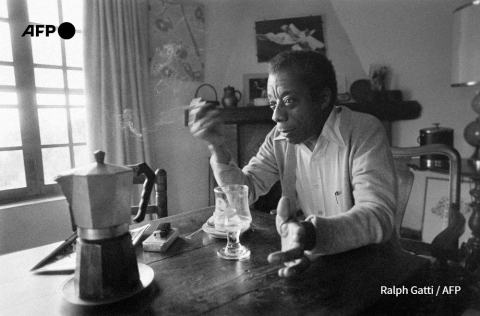
- James Baldwin -
US civil rights stalwart, novelist and poet, Baldwin influenced authors from Beat Generation idol Allen Ginsberg to Nobel literature laureate Toni Morrison.
Black and gay, he escaped American racism and homophobia in 1948, taking refuge in Paris for more than a decade before returning home to lead a nationwide campaign against segregation and becoming friends with the likes of Malcolm X and King.
In 1963 Baldwin's deeply personal exploration of racial injustice in "The Fire Next Time" fanned the flames of the American civil rights movement as it was exploding in the segregated South.
He was immortalised in Raoul Peck's Oscar-nominated documentary "I Am Not Your Negro".
